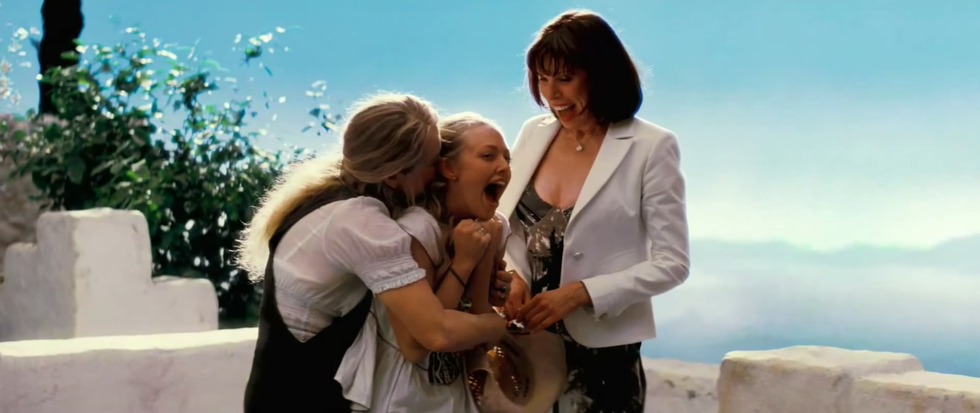With the sequel hitting theaters 10 years and two days after the first movie, "Mamma Mia! Here We Go Again" has been hyped ever since the sequel was officially announced last year.
In preparation for the new movie, I'll be reviewing the original 2008 film, "Mamma Mia!" which is both a fun summer escape and a modern feminist critique.
The film begins with 20-year-old Sophie sending three invitations to her wedding: each is to a man who might be her father. Sophie dreams of having her father be a part of her wedding and learning more about her identity, which she hopes will become clear once they arrive on the island.
Sophie sends the invitations without the knowledge of her mother, Donna, who raised Sophie on her own and has no desire to see any of the men again. Between Donna finding the men on the island and Sophie attempting to find her father before the wedding, the mixed-up mystery of a family has a lot to deal with before Sophie walks down the aisle.
As a summer blockbuster, this is such a cute film. From the setting to the dance numbers, everything is aesthetically pleasing and refreshing to take in.
As soon as Sophie and her friends burst into "Honey, Honey" while dancing around the island with her mother's diary, I was entranced.
For any fan of ABBA - or even anyone who knows their songs - it's incredibly satisfying to see Streep break into the titular song when she sees her three former flings for the first time.
Every song is performed with the same energy as a stage musical and you can see the love each actor puts out.
The echoes of its theatre predecessor continue in how the show was adapted: rather than just in the background, the chorus is incorporated into many scenes and interacts with the main characters.
This gives the movie a more immersive and classic feel, rather than doing the straight cinematic way.
The female friendships - between Sophie and her friends, Donna and her friends and Donna and Sophie - are all well-developed and make reviewers reminiscence about their own best friends.
It's hard not to feel nostalgic when the trios scream seeing each other again and break out chants from when they were younger.
Continuing the feminist themes, the women never hesitate to support each other. While Donna is initially upset when she reveals that any three of the men could be the father, her friends reassure her that her sex life is nothing to be ashamed of before bursting into "Dancing Queen."
Though marriage is a prominent theme in the movie and Sophie is eager to get married and be "given away" by her dad, the film always comes back around to the concept of choice.
It's Sophie's choice that she wants to get married, unlike her mother. It's her choice to include her father in her wedding, not because it's what she's "supposed" to do.
These ideas come full circle when Sophie chooses to include her mother instead and ultimately delays getting married.
The power is in if women get choices or not, not necessarily what they choose. In choosing her mother, the movie emphasizes the importance of familial relationships between women and what they are able to become without men.
Watching the movie, you can tell it's written and directed (and co-produced) by women. We can only hope the sequel is just as good.


















